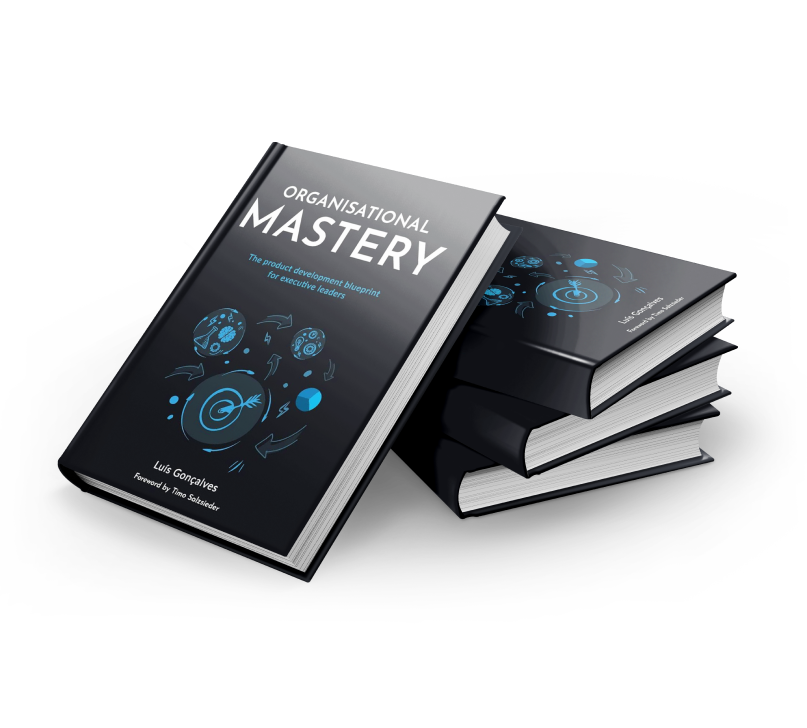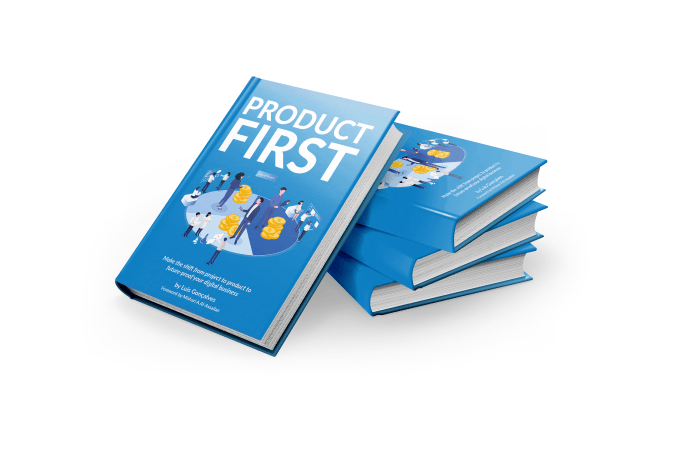Share this
How Google Sets OKRs: Everything You Need to Know to Grow Like Google
by Luis Gonçalves on Jan 13, 2024 6:10:43 AM
One of the most important skills that a modern leader can possess is the ability to align their entire workforce to the big vision of the company, that's why talking about how Google sets OKRs is very important!
Remember that aligning your entire organisation is just a small skill set that you must possess in order to ADAPT your company to the digital era! If you are an executive leader looking to ADAPT your company to the digital era, check more about our approach by clicking the link: ADAPT Methodology™.
Google owes its success to various factors. One of such is the goal-setting methodology that has played a key role in the company’s rapid success. This framework is known as Objectives and Key Results (OKRs).
[sc_product_cta product_title="OKR GUIDE FOR DIGITAL PRODUCT DEVELOPMENT" product_description="Do you want to know more about OKRs? We wrote a white paper that summarises everything that you need to know in order to start using OKRs in your company! Do not wait any longer and download your white paper now." product_img="8477" cta_url="https://adaptmethodology.com/okr-guide-en?utm_source=ADAPT_Methodology&utm_medium=CTA_Box&utm_content=How Google Sets OKRs&utm_campaign=OKR_Guide" cta_url_button_text="DOWNLOAD THE OKR GUIDE" /]
OKRs state the “what” goal of the company is or where it is headed. Objectives are with key results under them in order to basically determine whether the organisation has attained its objectives or not.
The key results should not be confused with “tasks” or a “to-do list”. Rather they should be the results of the tasks.
Larry Page of Google used this powerful tool to support his goal of making Google achieve growth by tenfold. It was a highly ambitious goal, but through OKRs, the company was able to progress rapidly and even exceed that goal.
How to Set OKRs Like Google - OKR at Google
Learning how Google sets OKRs will surely help to boost growth, productivity and engagement in your organisation. Check out the tips below.
-
Limit Your Objectives
Having too many objectives is not advisable. It will make you spread yourself too thin and hinders the focus of your team.
In Google, each employee ― from the CEO down to the level 1 employees, objectives don’t go above 5 items. There should be a maximum of 4 key results under each objective.
-
OKRs Need to Be Measurable
This is very important. In Google, OKRs are graded using the scale of 0-1. However, getting a perfect “1” is not the goal. In fact, if you achieve this score, you are only setting goals that are too easy in order to gain unfair advantage.
You need to go out of your comfort zone. The best score would be 0.6 or 0.7. If the objectives you set make you feel uneasy, you are on the right track.
-
OKRs Have to be Visible
OKRs promote accountability and transparency. More importantly, they drive collaboration between teams. At Google, everyone knows what everybody’s OKRs are.
They can access it anytime through a centralised database. Even bottom team members can see what the CEO is working on and vice versa. This way, teams and individual employees will know what help to offer and when.
-
50% of Organisational Objectives Need to Come from Bottom-Up
In Google, managers don’t tell their members what to do. The company believes that fostering employee accountability on their contributions promotes engagement.
Google has a unique and effective hiring process that lets them choose the best people. Being confident in their capabilities, Google believes that employees have different views on what the business needs.
OKR-setting in Google is multi-directional and considers employees’ feedback to be important.
-
OKRs Can Be Personal
Your OKRs may not be entirely about the goals of the organisation. Managers encourage employees to set goals for themselves, especially when it comes to team-member levels. It can be adopting a new management habit or pursuing a passion.
-
They Should Be Beneficial to Your Employees
There’s no doubt that OKRs bring immense OKR benefits to your company as a whole. However, it should also aid your employees. The framework promotes discipline by encouraging people to set ambitious or challenging goals and work hard to attain them.
-
Managers Need to Work Closely With Their Members
In Google, managers conduct one-on-one coaching sessions or check-ins with their team members. This is not only to monitor their progress, but also to provide guidance and ensure enlightenment.
These sessions facilitate open discussions about what the team member wants to do and what the company expects from him/her.
-
OKRs Are Not Performance Measures
This means that OKRs are not scorecards that can be utilised as the basis for promotion or salary increase.
While OKRs help managers assess how much an employee contributes to the overall goal of the company, they should not be used as a basis for recognition. This promotes even more engagement as employees would feel appreciated for their efforts.
-
Proper Cascading of OKRs
OKRs can be cascaded properly by mapping them across organisational teams and structures. As the leader, you should make sure that each of your teams and business units have the competencies and resources necessary to attain their objectives.
In view of the above, you will agree that knowing how Google sets OKRs can be very beneficial to your company. You can keep your employees in line with company goals through the S.M.A.R.T model like Google does.
It is important for managers to provide guidance for team members through coaching and extensive training in order to prepare them for success.
If you would like to understand OKRs and how they can benefit your business, check this OKR guide.
Are you ready to take your organisation to the next level? If you are, then be sure to follow the above practices adopted by Google. For more insights, check out the Google OKR video.
If you liked this article and you are looking for a way to align everyone in your organisation, we offer OKR consulting and OKR training inside of our ADAPT Methodology™ approach, contact us in case you are interested.
[sc_pathway pathway_title="THE ULTIMATE OKR GUIDE" pathway_description="Do you want to know more about OKRs? We wrote a white paper that summarises everything that you need to know in order to start using OKRs in your company! Do not wait any longer and download your white paper now." pathway_button_text="Download The White-Paper" pathway_button_url="https://adaptmethodology.com/okr-guide-en?utm_source=ADAPT_Blog&utm_medium=CTA_Box&utm_content=Bottom_Box&utm_campaign=OKR_Guide" /]
Share this
- Agile Methodologies (18)
- Product Strategy (18)
- OKRs (16)
- Scrum (16)
- Product Mindset (14)
- Project To Product (10)
- Agile Retrospectives (9)
- CoPs (9)
- Knowledge Sharing (9)
- Time To Market (8)
- Product Discovery (7)
- Continuous Improvement (5)
- Strategy (5)
- Scrum Master (4)
- Content Marketing Strategy (3)
- Product Owner (3)
- Technical Excellency (3)
- Digital Transformation (2)
- Innovation (2)
- Scaling (2)
- Team Building (2)
- Business Model (1)
- Cost Of Delay (1)
- Customer Feedback (1)
- Customer Journey (1)
- Customer Personas (1)
- Design Thinking (1)
- Digital Leadership (1)
- Digital Product Tools (1)
- Go To Market Strategy (1)
- Google Design Sprint (1)
- Lean Budgeting (1)
- Lean Change Management (1)
- Market Solution Fit (1)
- Organisational Impediments (1)
- Outsourcing (1)
- Product (1)
- Product Metrics (1)
- Product Roadmaps (1)

Organisational Mastery
Get your free copy

ADAPT
Get your free copy

Product First
Get your free copy
